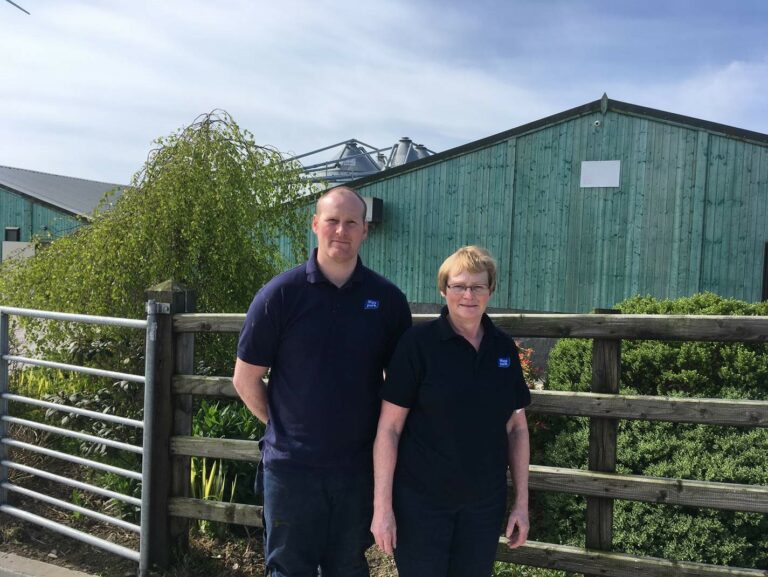Jonathan Kirk’s Leggygowan Eggs triumphed in the National Egg & Poultry Awards on the back of a meticulous focus on biosecurity and attention to detail
By Michael Barker
As far as traditional routes into farming go, it’s fair to describe Jonathan Kirk’s background as unconventional. The owner of Leggygowan Eggs in County Down actually spent the 10 years before starting the broiler breeder unit in 2013 as an electrician, wiring and fitting out hen houses, before moving directly into farming to assist his ageing father. And he hasn’t looked back since.
Leggygowan now has 24,000 birds across three bird houses, and has already achieved top flock once and been runner-up twice within its first six years of operation. The ultimate tribute to Kirk’s rapid success came last year when he won the Breeding Unit of the Year category at the National Egg & Poultry Awards 2019.
Kirk, who runs the business with his mother Margaret, says that far from being a hindrance, his background as an electrician has actually given him a unique edge: “I’ve got the maintenance end of thing down to an art,” he explains. “I think that’s a bit of an advantage as you can fix things immediately.”
Expanding on the theme, he believes reacting quickly to situations has helped boost Leggygowan’s KPIs, with the flock outperforming breed standards across a range of indicators. “I put it down to attention to detail and the knowledge that I can fix things straight away,” Kirk continues. “If a feed line is down, or something is not right, and that’s not fixed within a certain timeframe your production loses out. You can drop a percent and you won’t get that back. Our success is about the speed of correcting problems and attention to detail really. The work you put in during the time you’re not so busy is where you set yourself up for the rest of that term. If you don’t get it done by the time you’re actually busy, then you’re too busy to do it.”
One of the areas where Leggygowan most impressed judges was with its wide-ranging biosecurity efforts. Describing biosecurity as “of the utmost importance” to his poultry unit, Kirk outlines details such as the unit having its own separate barrier-controlled entrance with wheel sprayer and foot dip, another barrier controlling personnel access to the egg corridor and bird house entrances, additional showers, basins, foot dips and hand sanitisers, and steps such as freezing dead birds on site and then transferring them to the facility’s own incinerator.
“It all stems from starting how you mean to go on,” says Kirk, “so nobody has the chance to get into any bad habits. The incinerator was added midway through 2018 and now I’m trying to price an automatic sprayer so we can spray any lorries coming onto the site automatically.”
That focus on detail extends to staff training, and Kirk is meticulous in ensuring anyone visiting is fully briefed on biosecurity procedures before they even set foot on site. It’s all about not just training staff and visitors in the correct processes, but also in making sure they understand the rationale behind it.
The Moy Park supplier says the amount of scrutiny on the industry these days means you simply can’t afford to take any chances with biosecurity. “There’s always been a push, also from the likes of Moy Park, to be as biosecure as you can be and it’s just the way to go – you have to be proactive,” he says. “Even friends and neighbours of mine have said they don’t want to come onto the site because of the amount of [biosecurity] signs at the gate! And that’s what you want.”
Having narrowly missed out on a couple of other awards, it felt good to finally win last year, admits Kirk, describing it as “very pleasing and satisfying to get recognised for what you’ve done.”
He is upbeat about the future and is thankful for the decision to sign up with Moy Park – “they’ve got that financial backing and the size of them is a good thing in my eyes” – and believes Leggygowan is well placed to continue its progress. He is also confident that poultry will remain a key part of the shopping basket for years to come, despite pressure from the vegan lobby.
That leaves Kirk to wonder whether the industry could do more to get out its strong animal welfare message and highlight the pros of domestic production compared to imports from some other countries. “It’s about how you’re seen and perceived by the public, that’s a huge thing,” he says. “We are well scrutinised and fairly so, but I think the public aren’t so aware of how far we go with animal welfare.”
When you see how far Leggygowan Eggs goes to ensure the safety and quality of its product, it sounds like a positive message to shout about.


